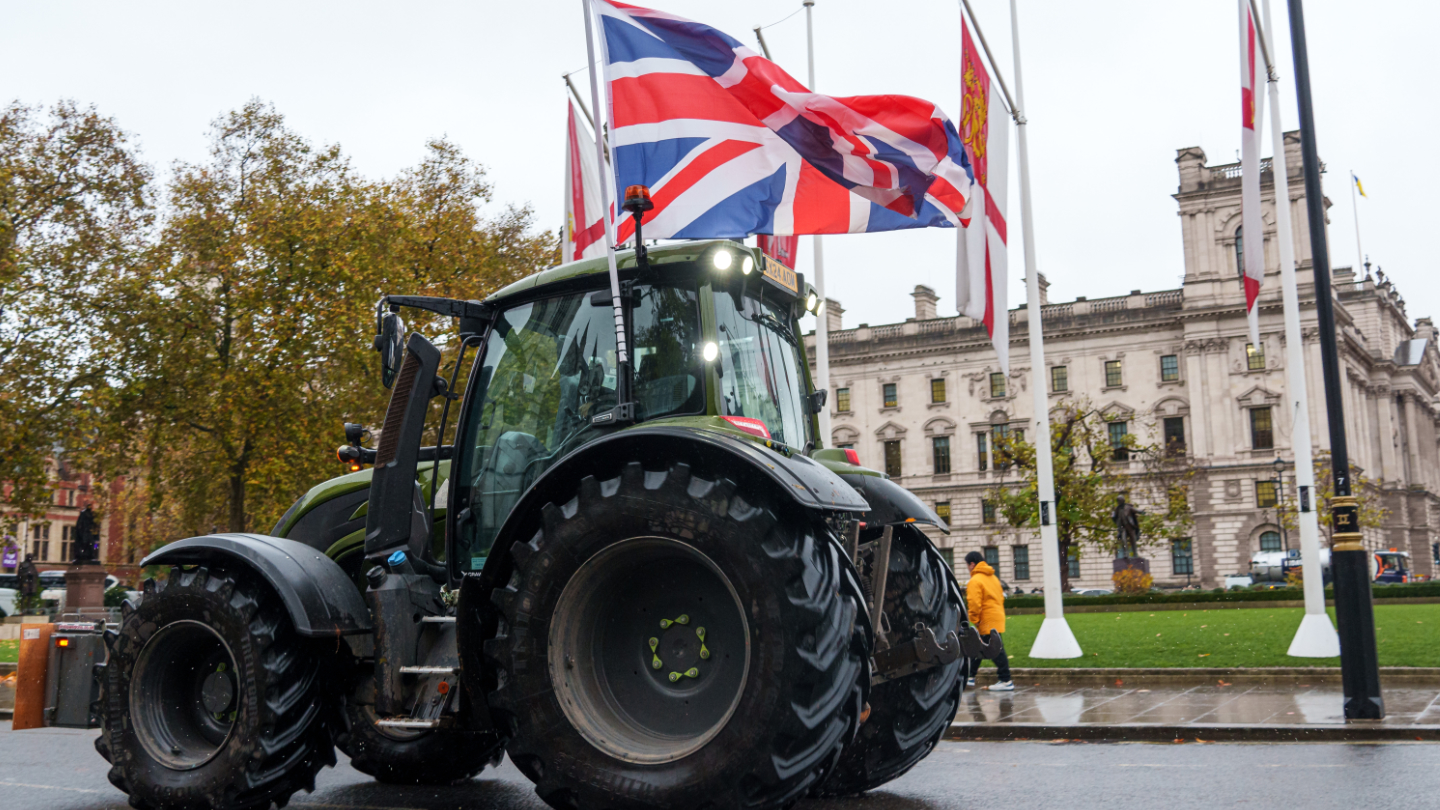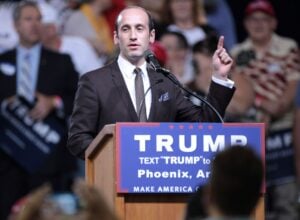Nieczęsto zdarza się, żeby Brytyjczycy protestowali na ulicy, zwłaszcza w porównaniu z Francuzami. Jeszcze mniej skłonni do awantur są brytyjscy rolnicy – w większości starsi, bielsi i bardziej konserwatywni od średniej krajowej. A jednak to właśnie oni w listopadzie zjechali do Westminsteru. Mieli do powiedzenia jedno: że nie podobają im się proponowane zmiany w przepisach o podatku spadkowym zawarte w ogłoszonym właśnie budżecie. Dla większego efektu rolnicy zabrali do Londynu swoje potomstwo i na czele demonstracji jechały dzieci na zabawkowych ciągnikach.
Ramię w ramię z farmerami szli politycy opozycji oraz byli członkowie i członkinie rządu (pamiętacie jeszcze Priti Patel?). Nigel Farage – nie tylko człowiek z ludu, bo tym razem także agrarysta i społecznik pełną gębą, przybył w lśniących kaloszach, co do których było pewne, że nigdy nie zapadały się w błotniste koleiny wiejskich dróg. Nikt nie palił opon ani nie rozrzucał gnojówki przed ministerstwem, za to przebrani za rolników politycy mieli swój moment. Szczególnie paradnie wypadli ludzie z tytułami szlacheckimi, celebryci oraz Jeremy Clarkson – ostatnio znany z telewizji już nie jako samochodziarz, ale, o dziwo, rolnik. Był tam nawet Andrew Lloyd Weber, który z trudem odnalazł drogę do Westminsteru, gdy miał oddać głos w Izbie Lordów (choć jego partia podwiozła go raz samolotem aż z Nowego Jorku, żeby nie ominęła go okazja zagłosowania przeciwko ulgom podatkowym dla pracujących biednych).
„Standard” donosił, że demonstrujący rolnicy stawili się w sile 20 tysięcy, chociaż rzeczywista liczebność była zapewne o połowę mniejsza. Nie te liczby jednak są teraz przedmiotem gorących sporów, ale nurtujące wszystkich pytanie: ilu rolników zapłaci podatek spadkowy i ile rząd wydrze im z kieszeni?
Nikt nie mógłby wyjaśnić tego lepiej niż telewizyjny rolnik z Amazon Prime, mistrz chłopskiego rozumu, Jeremy Clarkson! Poprosił o podniesienie ręki tych, którzy mają rodzinne gospodarstwo, a potem o jej opuszczenie, jeśli myślą, że propozycje rządu nie będą miały na nich wpływu. Niewiele rąk opada. Prawie wszystkie pozostają w górze. „I tyle w temacie” – zakończył.
Kto (nie) zapłaci
Tu jest pies pogrzebany. Jak się zapewne domyślacie, nie każde gospodarstwo o wartości przekraczającej milion funtów zostanie objęte nowym prawem. W praktyce (również ze względu na to, że system podatkowy faworyzuje pary małżeńskie i osoby z dziećmi) podatek spadkowy obejmie majątki o wartości około trzech milionów funtów w przypadku małżeństw i półtora miliona w przypadku singli. W latach 2021–2022 w całej Wielkiej Brytanii było zaledwie 117 gospodarstw rolnych wartych ponad 2,5 miliona funtów. Opodatkowaniu podlegałaby jedynie część majątku – ta powyżej trzech milionów funtów, i to po mizernej stawce 20 proc.
Bezrolne małżeństwa mogą tylko pomarzyć o tak łagodnym traktowaniu, bo te płacą podatek spadkowy w wysokości aż 40 proc. od wartości spadku przekraczającej 650 tysięcy funtów (325 tysięcy w przypadku singli). A i to nie koniec przywilejów, bo rolnicy, w odróżnieniu od wszystkich pozostałych, będą mieli aż dziesięć lat na zasilenie skarbu państwa należnym podatkiem. Całe dziesięć lat, bez odsetek – podczas gdy odsetki są już pobierane nawet od kredytów studenckich.
Zdaniem ekspertów większość gospodarstw wartych ponad milion funtów nadal nie zapłaci ani pensa podatku spadkowego. Nawet rządowi spece od finansów mówią, że zmiana przepisów obejmie jedynie około 500 gospodarstw rocznie. Nawet jeśli ta grupa nie będzie aż tak nieliczna, celem nowelizacji jest usunięcie kilku sposobów na unikanie podatków oraz zapobieżenie dalszej akumulacji ziemi w rękach nielicznych bogaczy – a nie „okradanie” ciężko pracujących rolników. Kupowanie ziemi stało się bowiem powszechnie znanym sposobem na unikanie podatków. Aż 40 proc. ziemi rolnej sprzedanej w 2023 roku przeszło w ręce „adoratorów wiejskiego stylu życia” i innych inwestorów, podczas gdy mniej niż połowę wszystkich gospodarstw sprzedanych w tym samym roku kupili rolnicy.
Można zrozumieć, że rolników, którym nigdy dotąd nie kazano płacić podatku spadkowego od rodzinnych majątków, rządowe plany wprawiły w osłupienie. Można wybaczyć, że pomylili się w obliczeniach, bo nigdy wcześniej nie musieli zaprzątać sobie tym głowy.
Ale przerażenie nadciągającym walcem podatkowym odczuwa mniej więcej co trzecia osoba na Wyspach, choć w rzeczywistości dotyczy to jedynie maleńkiego odsetka brytyjskich majątków. W latach 2020–2021 jedynie 3,73 proc. majątków płaciło podatek spadkowy. Na braku powszechnej, finansowanej przez państwo edukacji i bezwzględnym posłuszeństwie wobec systemu klasowego korzystają najbogatsi. Całe społeczeństwo obawia się i protestuje przeciw podatkowi spadkowemu, choć dotyczy on garstki najbogatszych.
Ziemia dla bogaczy
W istocie Wielka Brytania powinna znacznie wyżej opodatkować ziemię, która nie należy do rodzinnych gospodarstw rolnych, a przy okazji także każdy drugi i kolejny dom. Nie możemy dłużej pozwalać, by ziemia i stojące na niej domy były przedmiotem obrotu handlowego i narzędziem inwestycji; by służyły bogatym do ukrywania pieniędzy przed fiskusem albo generowania „dochodu pasywnego”.
W samej tylko Anglii połowa ziemi znajduje się w rękach zaledwie 1 proc. populacji. Około 25 tysięcy właścicieli ziemskich – głównie korporacji i tych, którzy otrzymali ziemię w spadku, bo wygrali taki los na urodzeniowej loterii – włada połową kraju. Wejście w posiadanie ziemi uprawnej daje automatyczne ulgi podatkowe nie tylko rolnikom, ale i landlordom. Między 2018 a 2020 rokiem tylko 44 proc. beneficjentów ulg podatkowych dla rolnictwa uzyskało jakikolwiek dochód z działalności rolniczej w ciągu ostatnich pięciu lat przed śmiercią. Zaledwie 200 majątków, o średniej wartości 6 mln funtów, pochłania aż dwie trzecie ulgi podatkowej dla rolników, oszczędzając na podatkach ponad milion funtów rocznie.
Jeśli pozwolimy, by bogaci kupowali jeszcze więcej ziemi – nie dlatego, że nas karmią, ale tylko dlatego, że ich na to stać – ceny ziemi będą nadal rosnąć. Szkoda doprawdy, że rolnicy słuchają nie ekspertów, ale typów w rodzaju Clarksona, który przyznaje w rozmowie z „Timesem”, że celem jego kampanii jest „zero podatku spadkowego od ziemi”.
Wśród rolników protestowali bowiem i tacy, którzy – można bezpiecznie założyć – nie przepracowali w polu ani pół dnia w życiu: Charles John Montague Manners, markiz Granby (słusznie przepełniony obawą, bo jego spadek to Belvior zamek wraz z niemal 6,5 tys. hektarów ziemi); wicehrabia Garnock, Lady Alice Manners i inni, którzy ziemi posiadają zdecydowanie za dużo. Wystarczyło otworzyć gazetę, żeby zapłakać nie tylko nad Clarksonem, ale nad wszystkimi miliarderami. Co czeka Lorda Anthony’ego Bamforda (właściciela, po ojcu, koncernu JCB znanego z produkcji ciężkich maszyn rolniczych i budowlanych)? Co będzie z nieszczęsnym Sir Jamesem Dysonem (zbieżność nazwiska ze znaną marką sprzętu AGD nieprzypadkowa)?
Dyson, który na tegorocznej liście największych na Wyspach bogaczy opracowanej przez „Sunday Timesa” spadł aż na piąte miejsce (z drugiego w 2022 roku), przy majątku wartym niemal 21 miliardów funtów, przekonuje, że „złośliwy” budżet wymierzony jest przeciwko rolnikom. Jaka szkoda, że nie pomyślał o nich, kiedy namawiał do opuszczenia wspólnego rynku Unii Europejskiej! Dyson, orędownik twardego brexitu, lubił opowiadać, że wyjście z UE uczyni Wielką Brytanię Singapurem Europy, po czym w 2019 roku przeniósł siedzibę swojej firmy z Wiltshire do Singapuru właśnie i wessał ogromne połacie brytyjskiej ziemi. Ziemi, do której – jak inni wielcy właściciele – otrzymuje dopłaty z pieniędzy publicznych.
Żyć, nie umierać! Bo im więcej ktoś posiada ziemi, tym wyższe pobiera dopłaty bez względu na to, czy tę ziemię uprawia. Przeciętne brytyjskie gospodarstwo rolne ma 82 hektary. Niemal połowa gospodarstw posiada mniej niż 20 hektarów, a sam Dyson ma aż 14,5 tysiąca hektarów w pięciu hrabstwach.
Rolnicy mają to, na co głosowali?
Rząd Partii Pracy próbuje dokonać nie lada wyczynu. Skala protestów uświadamia jednak, jak ważne jest, by skutecznie komunikował się z wyborcami, zwłaszcza gdy większość mediów trwale sympatyzuje z klasą właścicieli ziemskich.
Kiedy wczesną wiosną 2024 roku rolnicy wyszli masowo na ulice krajów Unii, brytyjskie gazety piały z zachwytu i podkreślały, jak to wspaniale, że opuściliśmy UE ze wszystkimi jej problemami. Tymczasem każda pobrexitowa umowa handlowa z odległym krajem, który nie przestrzega tych samych standardów produkcji żywności, podcina gałąź, na której siedzą brytyjscy rolnicy, a sprzedaż do UE, naszego najbliższego rynku, nastręcza im ogromnych trudności.
Jeszcze dotkliwiej niż unijne cła doskwiera im brak pracowników sezonowych, a na domiar złego wkrótce skończą się również rządowe dotacje, które przez krótki czas odpowiadały wcześniejszym płatnościom z Unii. Tegoroczne wypłaty są już o 50–70 proc. niższe od dotacji, jakie brytyjscy rolnicy otrzymywali przed brexitem.
Jak karpie wypatrujące świąt, rolnicy postanowili opuścić jednolity rynek, a teraz bronią interesów najbogatszych, których działania podnoszą cenę ziemi, ale nie poprawiają losu pracujących na niej ludzi. Wielka Brytania produkuje dziś mniej żywności i coraz bardziej polega na niekontrolowanym imporcie. Trudno polemizować z rolnikami, którzy twierdzą, że ich potrzebujemy. Bez ich pracy nie będzie co jeść. Dlatego na koniec muszę donieść, że protestujący rolnicy zwieźli na londyńskie ulice wielką obfitość swoich produktów. Nie po to, by je wyrzucić na bruk Westminsteru, ale by je przekazać w darze bankom żywności.

 Wspieraj
Wspieraj 

 Wspieraj
Wspieraj  Wydawnictwo
Wydawnictwo 
 Zaloguj się
Zaloguj się 
















